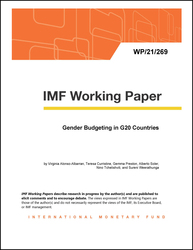
Gender Budgeting in G20 Countries
Gender Budgeting in G20 Countries
READ MORE...
Volume/Issue:
Volume 2021
Issue 269
Publication date: November 2021
ISBN: 9781616354510
$5.00
Add to Cart by clicking price of the language and format you'd like to purchase
Available Languages and Formats
| English |
Prices in red indicate formats that are not yet available but are forthcoming.
Topics covered in this book
This title contains information about the following subjects.
Click on a subject if you would like to see other titles with the same subjects.
Economics- Macroeconomics , Public Finance , Economics / General , Gender Studies , G20 , Gender Equality , Gender Budgeting , Public Financial Management , GB practice , GB tool , Gender budgeting (Gb , GB index , IMF Gender Budgeting approach , Gender inequality , Gender budgeting , Budget planning and preparation , Women , Africa
Summary
Achieving gender equality remains a significant challenge, that has only deepened with the on-set of the COVID-19 pandemic. Gender budgeting (GB) can help promote gender equality by applying a gender perspective to fiscal policies and the budget process. This paper takes stock of GB practices in G20 countries and benchmarks country performance using a GB index and data gathered from an IMF survey. All G20 countries have enacted gender focused fiscal policies but the public financial management (PFM) tools to operationalize these policies are far less established. We find that notwithstanding heterogeneity across countries, the average G20 level of GB practice is relatively low. More progress has been made establishing GB frameworks and budget preparation tools than with budget execution, monitoring and auditing. Too few countries assess the upfront impact of policies on gender and/or evaluate ex-post the effectiveness of policies and programs. Where GB features are in place, they tend to operate as an ‘add-on’, rather than a strategic and integral part of resource allocation decisions. Progress with GB does not appear to be dependent on the level of country development. Key to future efforts will be harnessing opportunities for integrating GB tools into existing PFM systems and more closely linking GB initiatives with PFM reforms.
Copyright © 2010 - 2026
Powered by:
AIDC



